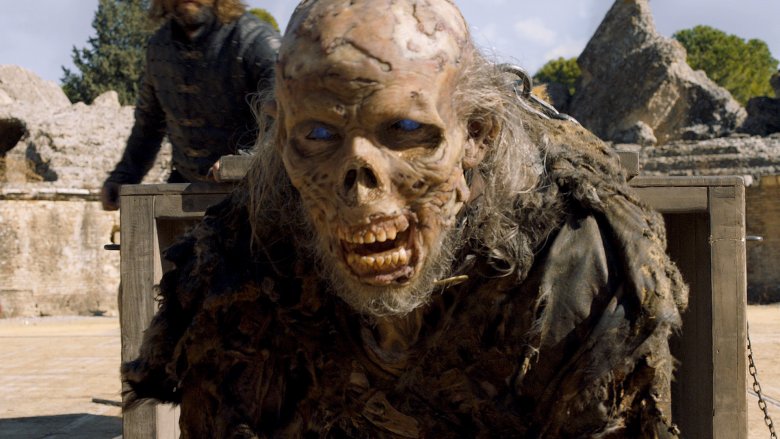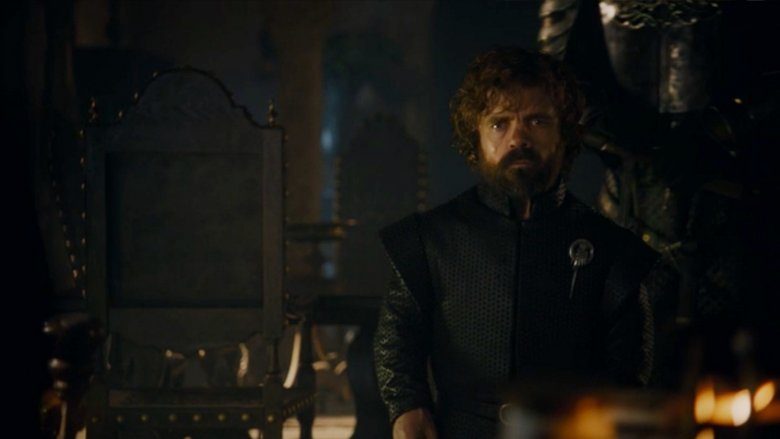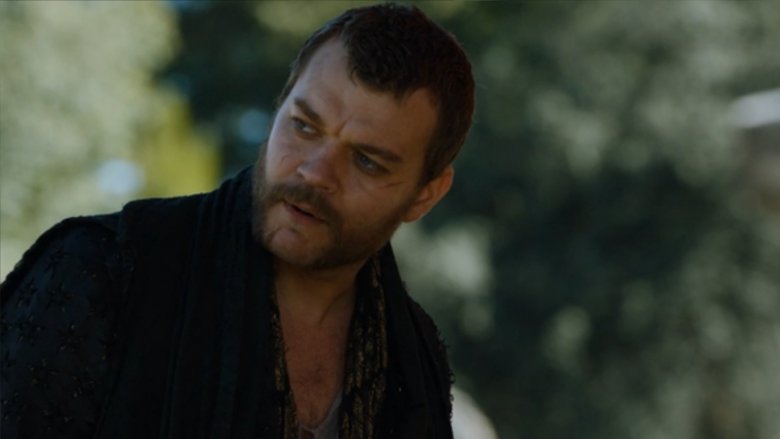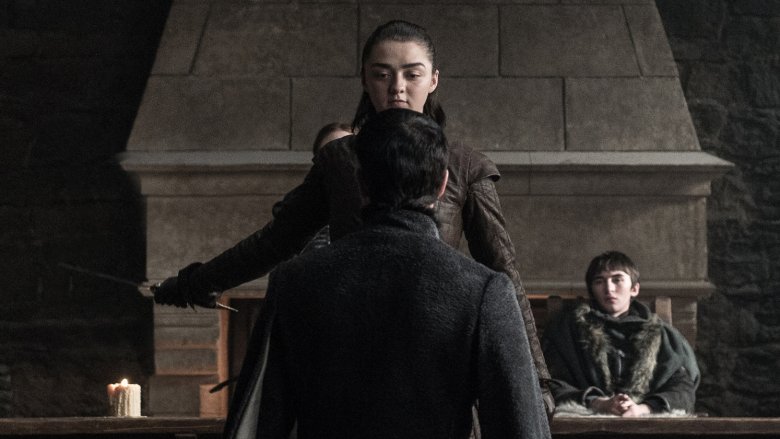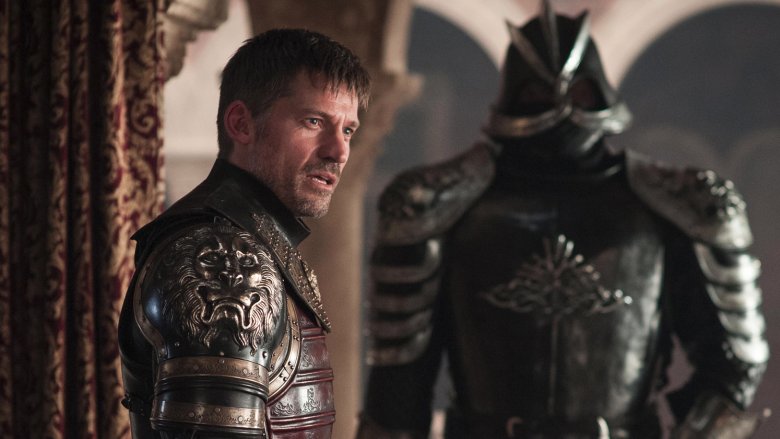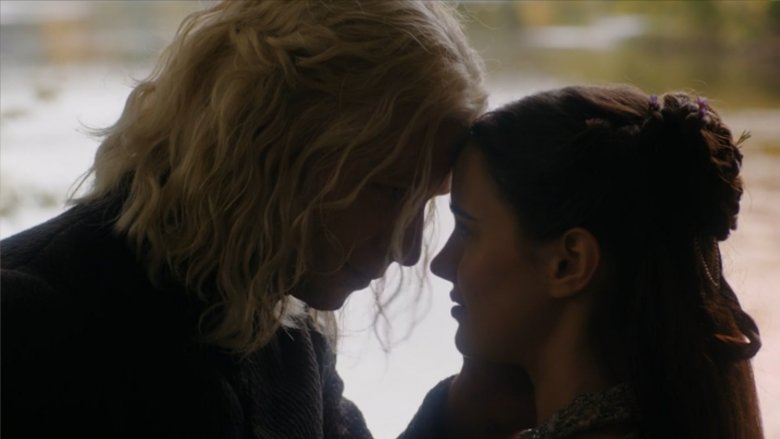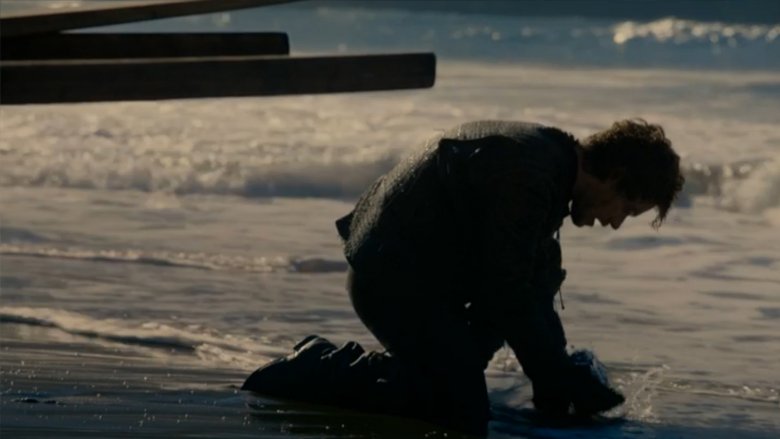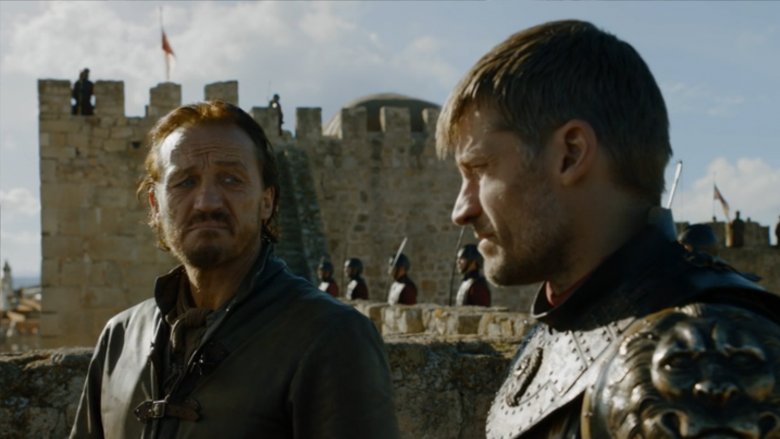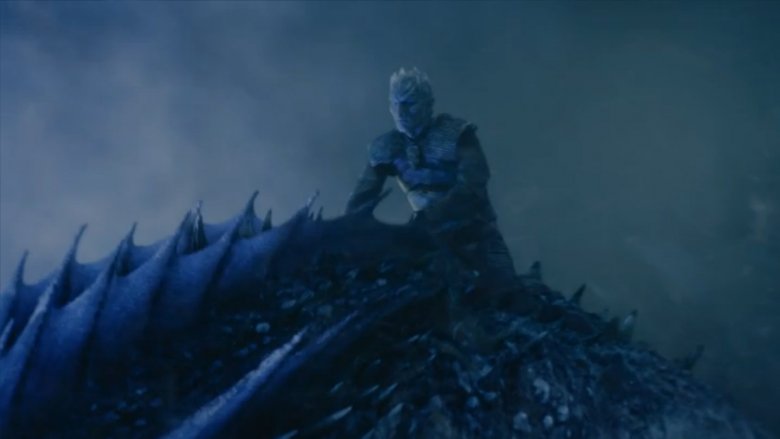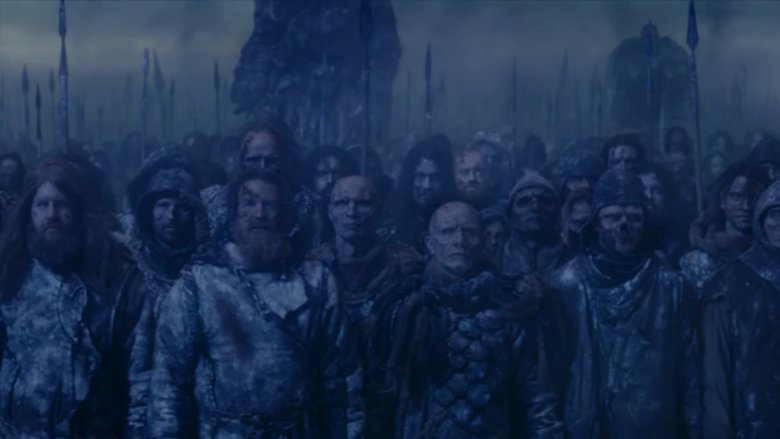The Ending Of Game Of Thrones Season 7 Explained
The season seven Game of Thrones finale answered many burning questions—but, as all good shows do, it left even more unanswered. With such a complex world and story, the deeper implications of character interactions and scenes aren't always immediately obvious. Let's take a look inside "The Dragon and the Wolf" to see what you missed and explore the potential repercussions for the eighth and final season of the series.
The things he does for love
Let's start by talking about that extremely tense conversation between Tyrion and Cersei after Jon's blunder in the Dragonpit. Cersei clearly still hates Tyrion, and even though she knows now that he didn't murder Joffrey, she still blames him for everything else that has befallen her, including the deaths of Myrcella and Tommen. This was an important point for her to play up, as Cersei knows Tyrion loved his niece and nephew. That's why her subtle "hand on belly" move wasn't so subtle at all, and why she had to resist the strong urge to have the Mountain kill Tyrion. Cersei wanted Tyrion to know she was pregnant, and she also couldn't kill him—not if she wanted her ruse to be successful.
Cersei wanted Tyrion to believe she wasn't happy he'd figured out she was pregnant. She knew that the automatic familial love he'd feel for the unborn baby would blind him to the fact that she was changing her tune about the truce so easily. Some viewers have theorized that Tyrion is now in league with Cersei, because the end of their conversation wasn't shown onscreen. However, it would make no sense for Cersei to let Tyrion know about her double-cross when she didn't even tell Jaime. The answer is much more simple: she played Tyrion like a fiddle, and he fell for it. While Daenerys and Jon are away in the North, Cersei will solidify her position and may even make a play for Dragonstone itself.
Euron's smarter than he seems
While Euron seemed like he was acting the fool at the Dragonpit meeting, there's a lot more to read between the lines. Euron knew from the start that Cersei would be lying if she "agreed" to any truce. He knew he was going to go to Essos in order to ferry back the Golden Company. While it's easy to dismiss Euron as a wild card with a class-clown streak, he's actually one smart (if marginally insane) cookie. Don't believe for a second that Cersei was actually upset about Euron interrupting Tyrion in order to make dwarf jokes and goad Theon. Euron's antics put the Targaryen alliance at a disadvantage, because it took the control of the meeting away from them, even temporarily. Euron's teasing had the bonus effect of depriving Dany of her remaining Ironborn. While they are few, their naval experience may have been valuable—the Unsullied aren't sailors.
Additionally, there was no way for Cersei and Euron to plan his "running away" act ahead of time—they had no way of knowing what they were about to see inside the Dragonpit. That was an inspired bit of improvisation from the Crow's Eye—one we're surprised Theon fell for. Since when has Euron—the man who sailed through the Smoking Sea—been afraid of anything?
Littlefinger's downfall
The final resolution of the season seven Winterfell plot was a welcome relief, although it may have left you confused. Even early in the episode, Sansa seemed to be fully taken in by Lord Baelish's lies, and both of the Stark sisters have been behaving oddly ever since Arya arrived back in Winterfell. So what was going on? Did Littlefinger nearly play them both, or were they stringing him along the whole time? While the sisters—and Bran—were certainly on the same page for Littlefinger's trial, the answer seems to be somewhere in the middle. Sansa was certainly in the dark for quite awhile, and this seems like a masterful play by Arya to show her sister Littlefinger's true nature.
When Arya learned Littlefinger was at Winterfell earlier in the season, her first question was, "what's he doing here?" It didn't escape her notice that Sansa brushed it off as unimportant—"oh, he's sworn himself to the North"—while simultaneously warning Bran that Littlefinger was not to be trusted. Later, Arya sees that Sansa seems to be relying heavily upon Littlefinger for counsel, apparently not even listening to her own advice. She realizes Sansa has grown complacent around Baelish, and sets out to expose him.
Given their argumentative history, Arya couldn't simply tell Sansa to get rid of Baelish; she had to show her. There's no doubt that Arya tested Sansa a little along the way to make sure she hadn't become Littlefinger's accomplice, but there's no way Arya actually believed all that stuff she said about Sansa serving the Lannisters. Sansa might have been a little slow on the uptake, but hats off to you, Arya—you've come a long way.
Jaime's choice
Cersei really screwed the pooch with this one. Her paranoia grows ever deeper, to the point that she didn't even tell Jaime about the plan to double-cross Jon and Daenerys. And all because Jaime didn't tell her beforehand about a meeting with Tyrion that he was tricked into attending? Her sociopathy and insanity really reached new heights this season, and it's interesting to note that the musical theme that begins to play when the Mountain draws his sword is from "Light of the Seven"—the theme that played while Cersei blew up the Sept of Baelor. Translation: Jaime is now her enemy.
By not filling him in, she forced him to make a choice between doing the right thing or doing his duty—much like the choice Jaime was faced with during the sack of King's Landing 20 years ago. By betraying Jaime this way, she finally succeeded in pushing him away—hard enough that he abandoned her. Along with losing the last person truly on her side, Cersei just threw away a major strategic advantage. Any element of surprise in her betrayal is now lost, as Jaime will explain what she's done when he reaches Winterfell.
Bran's flashback
In what was likely the most-anticipated scene of the entire series, Bran and Sam pieced together Jon's history, and we got a flashback to the wedding of Rhaegar and Lyanna. As Bran explains, this changes everything. When Rhaegar annulled his marriage to Elia, his children with her (Rhaenys and Aegon) became illegitimate. They no longer were part of the order of succession. When Elia and her children were killed in the sack of King's Landing, Rhaenys and Aegon died as bastards. Only the children that Rhaegar might have with Lyanna would be true Targaryens.
Rhaegar was Mad King Aerys' heir, and Lyanna's unborn son was Rhaegar's heir. When Rhaegar died on the Trident, that made Lyanna's unborn son the heir to Aerys. That's why there were three Kingsguard defending the Tower of Joy, but none with Viserys and Daenerys. When Aerys died at Jaime's hand, the newborn Jon was really the legitimate King of Westeros.
Why would Rhaegar give Jon the same name as his other son with Elia? With their marriage annulled, it was like those children with Elia had never happened. Rhaegar was obsessed with the prophecy of the Prince That Was Promised. He wanted the promised savior (and future King of Westeros) to be named Aegon. He knew Jon would be the fulfillment of the prophecy, and gave him the same name.
A Stark and a Greyjoy
The scene between Jon and Theon on Dragonstone was an unexpected but welcome shift in Jon's attitude since he first saw Theon a few episodes back. With great difficulty, Theon managed to articulate the struggle that's been evident in him since the beginning—the inner conflict of being torn between the worlds of Greyjoy and Stark. He was born a Greyjoy, but raised by a Stark.
For his whole life, Theon's been trying so hard to be one or the other, and always feeling like he's betraying part of himself. Jon gave Theon a bit of absolution for his past misdeeds, and some great advice: you don't have to choose. Balon Greyjoy was Theon's father by blood, but he was Ned Stark's son. Theon can honor the memory of both of them equally, as long as he's true to himself. Be a Stark and a Greyjoy. Theon's fight with Harrag on the beach is almost a rebirth of a sort, completed when Theon washes his face with seawater. What is dead may never die.
Questions of allegiance
While Jaime's allegiance is certainly in question now that he's abandoned Cersei, his loyalty isn't the only one that could be up in the air. To his credit, Jaime left alone and didn't try to betray Cersei by convincing others to join him. That being said, his absence will soon be noticed and felt keenly—especially following the death of Randyll Tarly. That leaves Cersei with very few experienced military men to lead her remaining forces. There's also the question of what Bronn will do. We saw Tyrion putting out feelers to the sellsword before the meeting at the Dragonpit, and Bronn hasn't been shy about complaining to Jaime about the castle he was promised.
With Jaime gone, Cersei could conceivably put him in charge of her army, but there's two big reasons why that won't happen. First of all, Bronn has a good relationship with Jaime, while Cersei wants Bronn dead for setting up that meeting between Jaime and Tyrion. Given her irrational behavior, she may even blame Bronn for Jaime leaving. Next, Bronn's agreement was with Jaime, not Cersei. As he told Jaime after pulling him out of the Blackwater Rush, "Until I get what I'm owed, only I get to kill you."
Jaime running off to fight the Night King doesn't sound conducive to Bronn's financial bottom line. Finally, we suspect Bronn won't remain behind to serve Cersei because of some real-life drama between the actors: Lena Headey (Cersei) and Jerome Flynn (Bronn) were romantically involved many years ago, and it reportedly ended so badly that the two still can't stand to be around each other. They don't film scenes together on Game of Thrones, which explains why Bronn took Podrick off for a drink before the Dragonpit meeting.
The Night King's mount
Viserion isn't an ice dragon, but there are definitely some perks to being undead. The dragon seemed to be faster and more maneuverable in the air than we've seen him before, and those freaky blue flames were quite impressive. You may have also noticed that Viserion was able to use his flame attack for quite a long time—at one point, he flamed continuously on one part of the Wall for a full minute. This makes sense when you realize that an undead dragon doesn't need to stop attacking to take a breath. We won't get into the logic of how an undead dragon is able to still create fire from now-rotting glands—this is a fantasy series, after all.
Speaking of rotting, the Night King's new mount might have one major weakness: decomposition. In the time it's taken the undead army to reach the Wall, Viserion has begun to rot. Those bat-like dragon wings were fragile to begin with, and now Viserion's have several holes. While the cold climate of the north will definitely slow the rate of decomposition, eventually Viserion's wings may be too riddled with holes to even get him off the ground. Additionally, the other undead (like the bear) seem to be extremely flammable after death. That may also hold true for Viserion, which means one well-placed strike by Daenerys could bring the Night King's mount down for good.
The Great War
After watching all the clues add up, it seems most likely that the war between the living and the dead will happen somewhere near Winterfell. Almost all of the major players are already at Winterfell or heading there now, and we'll likely see more faces turn up soon. They didn't explicitly show Beric and Tormund's death in the finale, and there were still Night's Watch structures standing atop the portion of the Wall at Eastwatch that survived. Don't be surprised if those two take a hike over to Castle Black and bring Dolorous Edd and the remaining Night's Watch back to Winterfell.
If the battle does occur at Winterfell, it might be a good thing for the living. Winterfell is situated high upon an open plain, and strongly built, with high stone walls—although walls obviously won't keep out a dragon. But Winterfell also offers one other major advantage: its crypts. The large underground complex could withstand a fiery attack and offer shelter to Jon's forces, as long as the Night King isn't able to use his raising powers on the Stark ancestors buried down there. Nobody wants to see a headless undead Ned wandering around.
Jon and Daenerys' future
While many fans no doubt cheered to see Jon and Daenerys give into their feelings for each other, they just made matters even more complicated than they already are. You could see this on Tyrion's face during the scene on the boat—he's worried. He likes Jon and believes completely in Daenerys, but love always complicates matters.
There's a major question of how the northern lords will react to learning that their King has bent the knee to Daenerys. Despite Jon's hope that they will see Dany for what she is, some of the pricklier lords may decide to leave his cause over it—especially if they believe their king knelt because he became smitten with the Dragon Queen.
Even worse, Bran and Sam's revelation threatens to bring the whole alliance crumbling to the ground. How will Jon react to learning that he wasn't a bastard at all, but the trueborn son of Rhaegar and Lyanna? Moreover, how will he react when he realizes that means that he's in love with his aunt—and that he technically has a better claim to the Iron Throne than she does? If we know Jon, then his advice to Theon may foreshadow how he deals with his own looming crisis of identity. He doesn't have to choose: he can honor both the wolf and the dragon.
